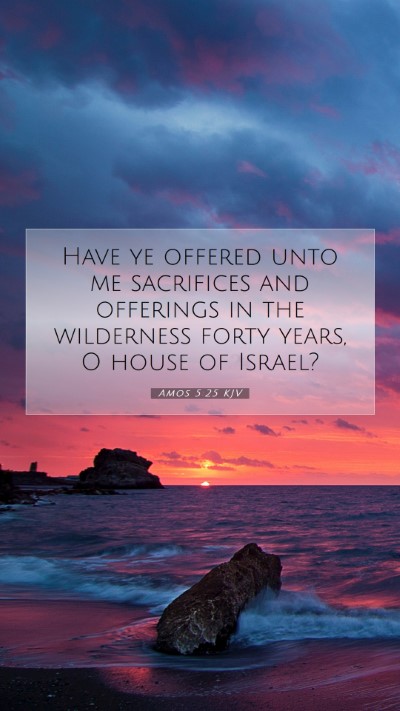Old Testament
Genesis Exodus Leviticus Numbers Deuteronomy Joshua Judges Ruth 1 Samuel 2 Samuel 1 Kings 2 Kings 1 Chronicles 2 Chronicles Ezra Nehemiah Esther Job Psalms Proverbs Ecclesiastes Song of Solomon Isaiah Jeremiah Lamentations Ezekiel Daniel Hosea Joel Amos Obadiah Jonah Micah Nahum Habakkuk Zephaniah Haggai Zechariah MalachiAmos 5:25 Meaning
What is the meaning of Amos 5:25?
Have ye offered unto me sacrifices and offerings in the wilderness forty years, O house of Israel?
Amos 5:25 Bible Verse Meaning
Understanding Amos 5:25
Amos 5:25: "Did you offer me sacrifices and offerings in the wilderness forty years, O house of Israel?"
The verse Amos 5:25 poses a rhetorical question emphasizing the futility of mere religious rituals devoid of true devotion.
Bible Verse Meanings
In understanding this Bible verse, it is essential to recognize the cultural and historical context in which it was written. The prophet Amos addresses the house of Israel, questioning their sincerity in worship during their time in the wilderness.
- Matthew Henry's Commentary: Henry emphasizes that God had no pleasure in empty sacrifices. True worship is essential, and God desires hearts aligned with His will rather than mere ritual observance.
- Albert Barnes' Commentary: Barnes notes that God remembers the wanderings of Israel. He indicates that their sacrifices were not offered to Him in sincerity during their wilderness journey but were an afterthought of rebellion.
- Adam Clarke's Commentary: Clarke elucidates that the verse is a reminder of Israel’s disobedience contrasted with God’s faithful provision. Their sacrifices, made in the wilderness, were not in a spirit of loyalty or gratitude.
Thus, this verse serves as a wake-up call to the Israelites – God desires a genuine relationship over premature acts of worship.
Scripture Analysis
This verse fits into the larger narrative of Amos, where the prophet calls out Israel’s social injustices and their neglect of true worship.
- Contextual Significance: The wilderness experience was pivotal for Israel, shaping their identity. Amos reminds them that despite their hardships, acceptable worship was expected.
- Spiritual Insight: The question serves to critique superficial religious practices while inviting self-examination among believers today to reflect on their genuine commitment to God.
Meaning of Bible Verses
This particular verse encapsulates the essence of many passages throughout Scripture that highlight the importance of authenticity in worship. It urges believers to examine whether their worship practices align with their hearts.
- Call to Authenticity: The Lord seeks authenticity in our relationship with Him, moving beyond rote actions to heartfelt devotion.
- Continual Examination: The call to self-examine one's faith practice is crucial and resonates across both the Old and New Testaments.
Application of Bible Verses
Amos 5:25 challenges us to consider our motives for worship. As modern believers, how do we offer sacrifices to God? Are we attending church, praying, or reading Scripture out of obligation, or do these actions stem from a genuine desire to connect with our Creator?
- Engagement with God: Encourage deeper engagement through prayer and study rather than just ritual participation.
- Bible Study Groups: Discuss the implications of true worship within various Bible study groups for enriched learning experiences.
Bible Study Insights
For anyone conducting an in-depth Bible study or seeking understanding of Scripture, Amos 5:25 serves as an example of how God desires affectionate worship rather than empty traditions.
- Discussion Topics: Delve into anything from the historical context of Israel’s sacrifices to modern-day applications of genuine worship.
- Bible Study Lessons: Create structured lessons based on this verse to inspire deeper reflection and personal application of God’s word.
Related Bible Verses
To further explore the themes presented in Amos 5:25, consider these cross-references:
- Psalm 51:16-17: Reflects the heart God desires — a broken spirit and contrite heart over mere sacrifices.
- Isaiah 1:12-14: Details God’s disdain for unworthy offerings and a call towards righteousness.
- Micah 6:6-8: Emphasizes that God requires justice, mercy, and humility rather than empty rituals.
Conclusion
Amos 5:25 acts as a pertinent reminder that God seeks our hearts and true intentions behind our actions. It encourages ongoing reflection and a commitment to cultivating a sincere relationship with Him.


